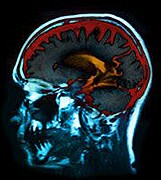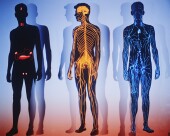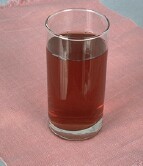| 
Overeating Can Throw Off Metabolism
 THURSDAY, Oct. 2 (HealthDay News) -- New research shows that overeating triggers a metabolic response normally dormant in the hypothalamus region of the brain, even when a person hasn't gained weight.
"We discovered a very general disease pathway in the hypothalamus, a structure in the middle part of the brain which functions to regulate appetite, feeding behavior, energy and therefore body-weight balance and metabolic processes," said Dr. Dongsheng Cai, senior author of a paper published in the Oct. 3 issue of Cell that details the findings.
"Persistent stimuli from excessive amount of calories can trigger this response before the overt onset of obesity, and this response when induced can promote overeating, contributing to increased levels of caloric overconsumption," Cai added. "So, this process can be like a vicious cycle."
Although the study was conducted in mice, the authors believe the findings will also apply to humans.
Suppressing the pathway might be a potent weapon in the war to fight the burgeoning epidemic of overweight and obesity and its attendant problems, including heart disease and even cancer.
Two-thirds of U.S. adults are overweight or obese; one-third are obese.
Current efforts to combat obesity -- namely dieting and exercise -- are rarely effective and certainly are not long-lasting.
"Exercise and diet may correct abnormal brain regulation [but] long-term food control is very difficult," said Cai, an assistant professor of physiology at the University of Wisconsin-Madison. "We don't understand why. . . The first important thing to understand is how the dysregulation of the brain is processed. The study we just did provides a new pathway. It's the opening of a new direction."
Until recently, researchers didn't know that the hypothalamus was important for how energy processing is conducted in the body.
"The brain is receiving more and more attention from the field . . . but nobody knows whether and how the hypothalamus could be responsible for the increasing occurrence of energy imbalance and obesity under today's environment typical of overnutrition," Cai explained.
Prior research had shown that eating too much triggered inflammatory responses in muscles, liver and other metabolic tissues, changes that underlie the development of type 2 diabetes. So the IKKb/NF-kB pathway had already been identified as a crucial player in these processes.
But it wasn't known if the same pathway was at work in the central nervous system.
In studying the brains of mice, Cai and his colleagues found that a high-fat or high-sugar diet did indeed increase the activity of this pathway in the brain as well. Similarly, the pathway is active in the brains of mice predisposed to obesity.
Once awakened, the pathway induces insulin resistance and dysfunctions of other hormones engaged with weight control and appetite.
While chronic inflammation was once thought to be a result of obesity, it now appears to promote it as well.
More information
The U.S. Centers for Disease Control and Prevention has more on overweight and obesity.
|  |

Childhood Dairy Intake Boosts Bone Health Later On
 THURSDAY, Aug. 14 (HealthDay News) -- Having two or more servings of dairy products a day starting as a preschooler may lead to better bone health as an adolescent, a new report says.
The study, expected to be published in The Journal of Pediatrics, found higher levels of bone mineral content and bone density in teens who consumed dairy at least twice a day since the ages of 3 to 5. These adolescents' average bone mineral content was 175 grams higher than adolescents who had consumed less than two dairy servings a day, even after researchers adjusted the results for factors that affect normal bone development, such as the child's growth, body size, and activity level.
The study highlights the significant role dairy plays in childhood as "a key source of proteins, calcium, and other micronutrients including phosphorus and vitamin D," study researcher Lynn Moore, of Boston University School of Medicine, said in a news release issued by the journal.
The researchers also found that children who combined their 2 or more servings of dairy with 4 ounces of meat or other nondairy protein during a day had bone mineral contents more than 300 grams higher than those children with lower intakes of both dairy and other proteins.
The findings come from analyzing data and family food diaries from the Framingham Children's Study, which gathered information from 106 children, 3 to 5 years of age at the beginning of the study, over a 12-year period. Information from the U.S. Department of Agriculture was also used to determine the children's average daily intake of dairy and other foods.
More information
The U.S. Centers for Disease Control and Prevention has more about bone health.
|  |

Too Much Salt Boosts Blood Pressure
 FRIDAY, Aug. 8 (HealthDay News) -- A British study adds more evidence for the link between dietary salt intake and high blood pressure.
The study, which included researchers at the University of Cambridge, looked at one possible genetic factor that might make people more or less vulnerable to the effects of salt intake on blood pressure -- variants of a gene for angiotensinogen, a molecule that can raise blood pressure by tightening arteries.
But the study of more than 11,000 European men and women found no relationship between variant forms of the gene and the effect of salt on blood pressure. The people who took in and excreted more salt had higher blood pressure, regardless of genetics, according to the report in the August issue of the American Journal of Clinical Nutrition.
"It is a carefully done study that strongly confirms the relationship between salt and hypertension [high blood pressure]," said Dr. Mordecai P. Blaustein, a professor of physiology and medicine at the University of Maryland School of Medicine who has done research on the mechanism by which too much salt causes high blood pressure.
"The power of this study is that it includes a very large cohort," said Blaustein, who is also director of the Maryland Center for Heart, Hypertension and Kidney Disease. "Also, they directly measured salt excretion."
Dr. Paul R. Conlin, an associate professor of medicine at Harvard Medical School, who wrote an accompanying editorial in the journal, added: "The study clearly showed that people who had elevated salt intake were the ones who had high blood pressure. That was independent of the genotype for this specific gene."
But, Conlin added, it would be an "oversimplification" to say that the angiotensinogen gene is the only gene that might influence blood pressure through salt intake. "It is clear that this is the tip of the iceberg," he said. "The hypothesis they tested was reasonable, but they only tested one gene."
Other researchers have identified genes that predispose people to high blood pressure, but they are "very uncommon," Conlin said. "The vast majority of the people we know who have high blood pressure do not carry a gene that we know of."
People shouldn't think about their genes when they salt their food, Conlin said. "You can't worry about your genotype because you can't do anything about it," he said. "This study reaffirms that salt intake has a significant effect on blood pressure, and that is clearly something that you can control."
Left untreated, high blood pressure increases the risk of coronary heart disease, heart attack and stroke.
More information
Learn about high blood pressure, why it is bad for you and how to control it from the American Heart Association  . .
|  |

Study Explains How Cranberries Prevent Urinary Infections
 THURSDAY, July 31 (HealthDay News) -- Researchers at Worcester Polytechnic Institute say that have solved the mystery of how cranberry juice prevents urinary tract infections.
Their study, published in the current issue of Colloids and Surfaces: B, shows that the juice changes the thermodynamic properties of bacteria in the urinary tract to form an energy barrier that prevents infections from developing.
The research team found that when bacteria with hair-like projections known as fimbriae, which is present on virulent bacteria that cause urinary tract infections, is exposed to even low concentrations of cranberry juice that energy levels increased to levels that made it difficult for the bacteria attach to a cell.
When the bacteria and urinary tract cells were placed in a solution, fewer and fewer attachments were observed as the concentrations of cranberry juice were added to the mix.
Cranberry juice did not appear to affect bacteria without fimbriae, which suggests something in the juice may directly change the molecular structure of the fimbriae themselves.
"Our results show that, at least for urinary tract infections, cranberry juice targets the right bacteria -- those that cause disease -- but has no effect on non-pathogenic organisms, suggesting that cranberry juice will not disrupt bacteria that are part of the normal flora in the gut," Terri Camesano, an associate professor of chemical engineering at WPI, said in a university news release. "We have also shown that this effect occurs at concentrations of cranberry juice that are comparable to levels we would expect to find in the urinary tract."
Camesano said that unpublished work also shows cranberry juice has potent effects on disease-causing bacteria, but that the effect is temporary. "This suggests that to realize the antibacterial benefits of cranberry, one must consume cranberry juice regularly, perhaps daily," she said.
Other work her lab did shows that regular cranberry juice cocktail and sugar-free cranberry juice both work effectively to prevent urinary tract infections.
More information
The U.S. National Library of Medicine has more about urinary tract infections.
|  |
|